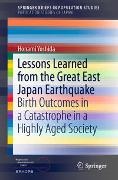En savoir plus
This book provides insights into the enormous impact of fetal and newborn loss in the aftermath of the natural disasters that Japanese society constantly has to face. It first reveals effect of the Great East Japan Earthquake in 2011 on the next generation and reproductive attitudes and shows that prenatal care strategies for emergencies had not been established by any local government in Japan. With continuing research on birth outcomes in the area surrounding the catastrophe, the authors emphasize the importance of the pre-hospital obstetric care team in disaster response and highlight the inequality in health care in a highly aging society like Japan, where perinatal health care is given lower priority than elderly care.
Following the creation of a specialized project for pre and postnatal care the authors conducted surveys on how community preparedness in maternal and child health for post-disaster areas impacted population changes.
This book is a valuable resource for researchers who are interested in the association between rapid population decline and the disaster management system for maternal and child health, as well as the effect of culture, gender bias, and family traditions.
Table des matières
Introduction.- Observational study to see a huge impact of disaster on Japanese population: National Database study.- Fetal loss and maternal death in disaster area.- Maternal and Child Health in disaster: Lessons learned by mega-disaster in Japan.- Community Preparedness toolkits for post-disaster maternal care.- Local governmental obstetrics training and network building system.
Résumé
This book provides insights into the enormous impact of fetal and newborn loss in the aftermath of the natural disasters that Japanese society constantly has to face. It first reveals effect of the Great East Japan Earthquake in 2011 on the next generation and reproductive attitudes and shows that prenatal care strategies for emergencies had not been established by any local government in Japan. With continuing research on birth outcomes in the area surrounding the catastrophe, the authors emphasize the importance of the pre-hospital obstetric care team in disaster response and highlight the inequality in health care in a highly aging society like Japan, where perinatal health care is given lower priority than elderly care.
Following the creation of a specialized project for pre and postnatal care the authors conducted surveys on how community preparedness in maternal and child health for post-disaster areas impacted population changes.
This book is a valuable resource for researchers who are interested in the association between rapid population decline and the disaster management system for maternal and child health, as well as the effect of culture, gender bias, and family traditions.

